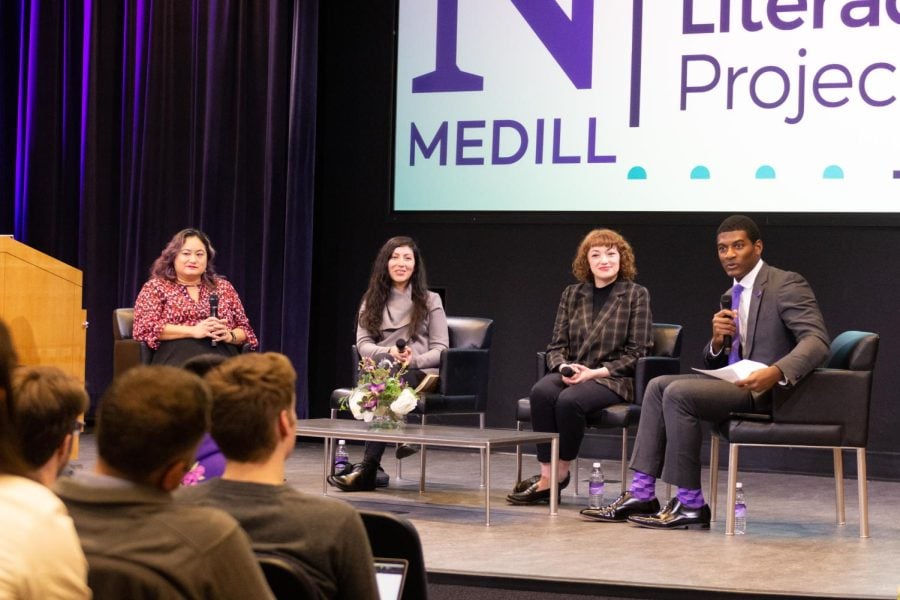News Literacy Project panelists discuss misinformation epidemic, building trust in media
Madison Bratley/Daily Senior Staffer
CNN Correspondent Omar Jimenez moderated the panel, in which three Chicago journalists spoke on methods to repair relations with underrepresented communities.
January 25, 2023
If journalism is the “first rough draft of history,” how do journalists earn and maintain the trust of an often skeptical audience?
At a panel moderated by CNN Correspondent Omar Jimenez, Chicago-based journalists Jen Sabella, Jennifer Kho and Alejandra Cancino aimed to answer questions like this on trust as part of the fourth annual National News Literacy Week.
The Tuesday event, hosted in the McCormick Foundation Center, began with a welcome message by DeMario Phipps-Smith, the senior manager for community learning at The News Literacy Project. A nonpartisan education nonprofit that launched in 2008, the project aims to create a more news-literate America.
Phipps-Smith said each panelist at the event took steps within their local newsrooms to repair relations with underrepresented audiences and build trust with sources.
“Chicago has produced some of the most renowned journalists nationwide and is home to some of the most innovative and cutting-edge media organizations in the country,” he said.
Sabella, co-founder of Block Club Chicago, said her publication recently worked with Northwestern’s Metro Media Lab to launch a set of surveys to gauge citizen trust in the media and journalism.
Survey data indicated a slight increase in trust in media compared to other institutions, like the government, between December 2019 and May 2020.
“I do see trust going up,” Sabella said. “Numbers in the south and west sides of Chicago — communities that have been covered poorly for years — are climbing. Journalists have to show up to these communities and actually listen and not assume they know what a community is about.”
The Robert R. McCormick Foundation awarded Medill $1 million to launch the Metro Media Lab in 2020.
The lab helps local news organizations to engage with their audiences and maintain sustainable business models despite a dynamic media landscape, according to the University.
The space also aims to equip journalists to understand audience needs and train consumers to avoid misinformation on social media.
Jennifer Kho, the Chicago Sun-Times executive editor, said the publication addressed its audience’s needs by removing the paywall on its website, increasing digital content accessibility. The paywall removal resulted in a flurry of positive and negative feedback on how stories were being covered, she said.
Alejandra Cancino, deputy editor of City Bureau, said her outlet invested in the Documenters Network, a newsroom-sponsored program training citizens on the procedures and language of city council meetings.
“It goes back to not only educating the consumer but providing them with the tools to have agency in their lives,” Cancino said. “It is totally a win-win when you think about news literacy — the whole reason why we’re here today.”
She also said news consumption often unintentionally sparks internalized racism, so journalists must consider how they portray stories and which voices they include.
At the end of the panel, the three panelists agreed on one step newsrooms can take to better engage with consumers: voicing the opinion of non-authority figures.
“It’s really hard to find a time in history when people feel the narrative is predominately inclusive and fair, and because of that, we know there is a lot of room to grow and improve,” Kho said. “We must avoid going to the same people and telling the same narratives over and over.”
The most significant advantage of local news outlets is that journalists have ample opportunities to understand and explore the community and its members, Kho said.
By fostering personal relationships with local community members over time, she said journalists can most effectively develop trust.
“I was struck by a Pew Research statistic about how few people have met a journalist,” Kho said. “We must try to humanize ourselves, speak to as many people as possible and prioritize transparency.”
Email: charlotteehrlich2025@u.northwestern.edu
Twitter: @charlottehrlich
Related Stories:
— Medill Local News Accelerator aims to support Chicago outlets
— Perry: College newsrooms should help fix their readership’s media literacy
— Medill receives $1 million grant from McCormick Foundation to support local news



